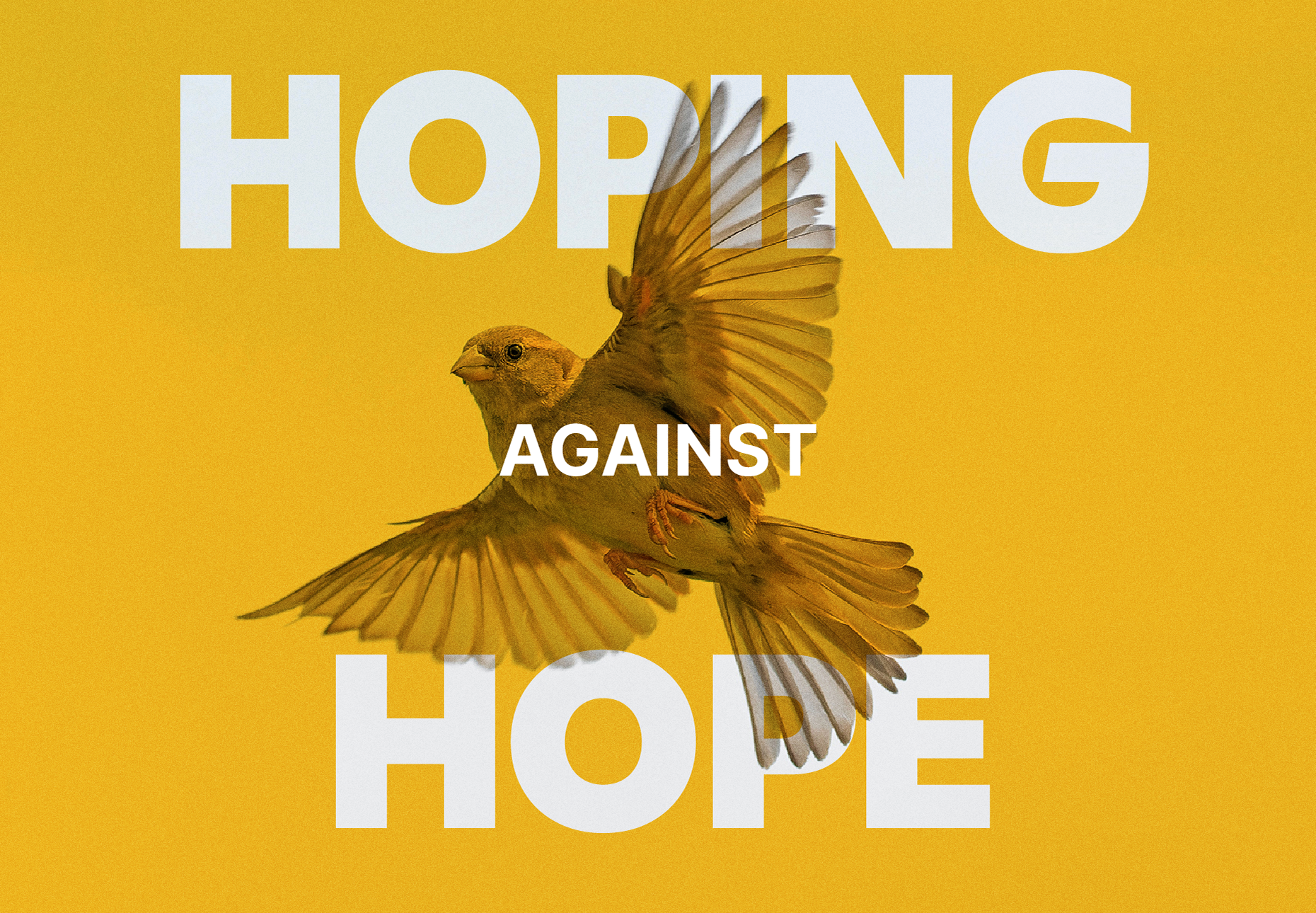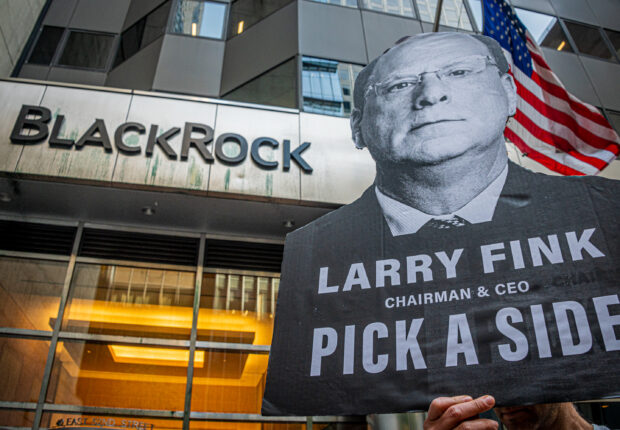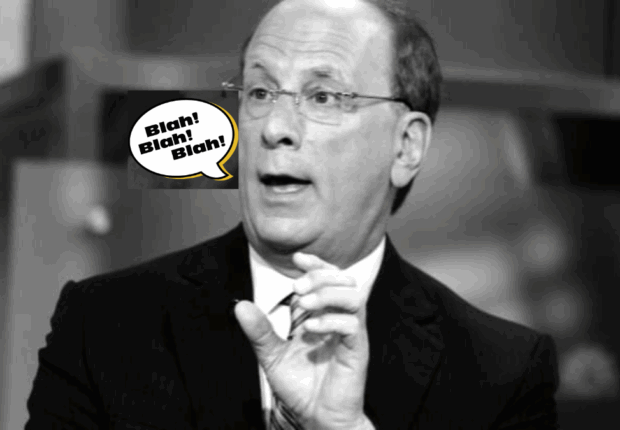BlackRock cannot talk about hope for the future without addressing climate in the same breath.

BlackRock did not release Larry Fink’s annual letter in line with past publication patterns after all. Instead, Fink took the stage at the World Economic Forum in Davos last week and said that his letter was to be expected some time in the first quarter and that the focus would be on ‘the concept of hope’.
“When I think about the need for global trade and the need for a more resilient world and world economy, I think the only way we’re going to achieve that is if we have more governments focusing on the concept of hope. If you look back on the last three years, I think the word ‘hope’ has been forgotten. We’re seeing a decline in birth rates worldwide, accelerated during Covid, we’re seeing more polarization worldwide politically, we have more anger, we have a war, and if we are really going to re-engage growth, people have to have a belief that investing money today for something that you’re going to get back in 20 or 30 years. You’ll only do that if you believe tomorrow is a better place to be.” – Larry Fink
Fink managed to name pressing global crises we are facing without mentioning climate once. This is a glaring omission. Any conversation around hope and long-term investment and retirement considerations must prioritize the need for a livable planet. If BlackRock wants to re-instill hope, and encourage clients to have faith in long-term investments, it needs to first rebuild confidence in the firm’s ability to navigate the most pressing crisis of our time.
HOPE = IGNORING THE NOISE, BUT FACING THE MUSIC
BlackRock has been a particular focus of a right-wing campaign in the U.S. aimed at preventing financial institutions from pursuing any type of climate measure. One of the primary aims of these “anti-ESG” bills is to punish banks and asset managers that are responding to the systemic risk posed by climate change — something well within the boundary of their fiduciary duty. Forcing investors to ignore risk is a ridiculous mandate that causes losses for both clients and taxpayers. It is clear that this is not based on economic best practices, but is rather a political ploy to delay the inevitable: the obsolescence of industries that are unable to adapt to the transition.
For BlackRock, however, the bark of these GOP antics is worse than the actual bite. The AUM that anti-ESG red states are threatening to pull — or have pulled — from BlackRock is but a figurative drop in the bucket. The amount of assets BlackRock manages for climate-concerned clients outweighs the amount of AUM red states have withdrawn by a factor of almost 1,000 — $4.2 billion versus over $3.3 trillion.
This disparity hasn’t gone unnoticed by BlackRock. Fink’s public statements at the World Economic Forum made it very clear that the asset manager is aware that its international business relies on taking climate change seriously: “If you do not have a lens toward decarbonization, you will not win one euro of business.”
It remains to be seen if and how BlackRock will take steps to address concerns voiced by clients over the sizable gap between the company’s net zero commitment and the status quo of its current business practices.
HOPE = VOTING FOR THE WHOLE
BlackRock’s clients are universal owners of the economy, and as such are exposed to wider market risks caused by the climate crisis. It therefore follows that BlackRock, as a steward of its clients’ assets, should be protecting those clients — including through voting and engagement — by identifying, minimizing, and mitigating systemic risks.
The vast majority of BlackRock’s client base understand the very real financial risk and cost of the climate crisis. While some small number of clients may prefer votes that are inconsistent with achieving rapid decarbonization in line with scientific targets, BlackRock has now committed to giving such clients that opportunity. For the remaining voting bloc, BlackRock must represent the best interests of its total client base and the global economy by voting in ways that are consistent with a 1.5°C pathway.
BlackRock’s focus on individual corporate governance on a case-by-case basis does not adequately address nor minimize the systemic risks facing its clients. Unless BlackRock uses all of the engagement tools at its disposal to actively drive down emissions across the heavy polluting sectors, clients will continue to face long-term systemic risks.
HOPE = INVESTING IN THE FUTURE
The world is at the precipice of a potential energy revolution. While Republicans in the U.S. are scrambling to enforce continued funding of the fossil fuel sector, the landmark IRA legislation has opened up a new horizon in clean energy projects, fostering both new technologies and domestic manufacturing opportunities.
The EU has the opportunity to replace fossil fuels with cheaper, readily available, less conflict-prone renewable energy sources instead of plunging the continent ever more deeply into reliance on coal, oil, and gas. The benefits of an accelerated energy transition are manifold. Leaving volatile, dirty fossil fuels behind would allow leaders to permanently bring down the cost of living for citizens while lowering emissions and achieving greater energy security at the same time.
Renewable energy opportunities in South East Asia was also a discussion topic at the World Economic Forum. While the region currently still relies heavily on fossil fuels, policies adopted across the region increasingly favor renewable energy sources. The share of renewable energy increased to 14% of the energy mix in 2020 and has continued to rise, even during the pandemic.
Capturing the opportunities offered by the energy transition is in the clear interest of investors. At the same time, they must be wary of false solutions such as carbon offsets, or overblown promises for unproven technologies such as Carbon Capture and Storage. Should they ever become operational at scale, they must be reserved for specific sectors that are hard to decarbonize and should not be used as a justification for fossil fuel expansion.
This is where asset managers like BlackRock can and should help its clients navigate the transition, not to mention fulfill its fiduciary obligations by helping clients avoid the financial risks associated with the fossil fuel sector when coal, oil, and gas assets lose value and drag down portfolio performance. The hopeful path is also the profitable one, a path that commits to investing in the future instead of clinging to the past.
HOPE = MOVING ON FROM THE PAST
In 2020, BlackRock released a thermal coal exclusion policy, which essentially sees the asset manager acknowledging and at least partially acting upon stranded asset risk tied to the sector.
In so doing, BlackRock set an important precedent for what are consequent next steps. The policy needs to now be strengthened to cover passive funds, it should include absolute production limits, and it must exclude companies developing new coal projects.
Any coal expansion projects are inconsistent with a 1.5°C target, as confirmed in the IEA Net Zero Emissions scenario. A full coal phase-out by 2030 in OECD and European countries and by 2040 globally at the latest has been emphasized as necessary by the UN’s High Level Expert Group on net zero commitments. BlackRock needs to commit to restrict financing in accordance with this standard.
HOPE = HONORING INDIGENOUS RIGHTS
BlackRock has identified certain risks associated with Indigenous rights violations and demanded disclosure, which is a positive step. However, the asset manager still falls short of adopting a comprehensive Indigenous rights policy that can be applied across its entire portfolio and that communicates transparent expectations, timelines, and consequences for corporate inaction on these issues. This policy needs to honor — inter alia — the right to self determination, the right to plentiful clean drinking water and breathable air, and the right to access and manage traditional lands and territories.
Not only will a comprehensive policy result in concrete improvements for communities and ecosystems, but it also fulfills BlackRock’s fiduciary obligation. Time and again, failure to respect Indigenous rights has exposed companies and their investors to legal, political, reputational, and operational risks. These risks can take the form of project delays and even cancellations, resulting in significant financial loss. In short, it is both a moral and economic imperative to center Indigenous rights.
WHAT WE HOPE TO SEE IN LARRY’S LETTER
As the world’s largest asset manager, and the largest manager of pensions, BlackRock cannot talk about hope for the future without addressing climate in the same breath.
We agree with Larry Fink — hope should be at the heart of how we forge ahead. That means planning for the future. That means protecting that future. And that means investing in it accordingly. BlackRock can and must truly center climate in its business practices. The path forward is the one according to the science and the will of the majority of BlackRock’s investors.
Two years ago, Fink announced in his letter that BlackRock intended to lead the way in helping clients navigate the transition to a decarbonized economy. Our hope is that this year, Fink’s letter will contain the concrete next steps that allow BlackRock to fulfill this promise of climate leadership.

